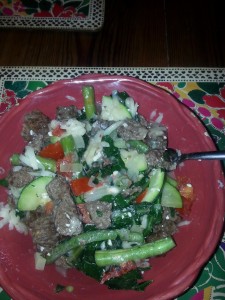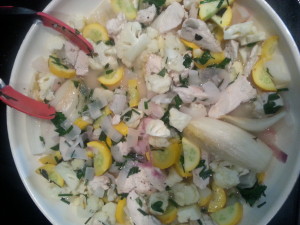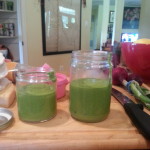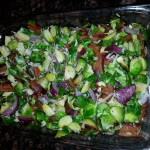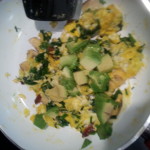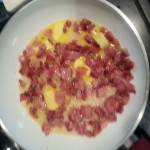 Okay, 2 days under my belt, ZERO ketones on my Ketonix meter ( expected that, I’m hoping that they show up by Friday.) My weight dropped below 130 for the first time since last summer (129.4) – this is not a drop in body fat! This is just a little water weight leaving. Remember: glucose ( carbs ) are stored with water – always; and that “storage” is ALWAYS in the form of fat/triglycerides, not glucose. (woops – actually, there’s a little glycogen storage in the liver, 1.5 to 2 teaspoons). My normal weight really seems to be 130 – 132, usually pretty steady. We’ll see.
Okay, 2 days under my belt, ZERO ketones on my Ketonix meter ( expected that, I’m hoping that they show up by Friday.) My weight dropped below 130 for the first time since last summer (129.4) – this is not a drop in body fat! This is just a little water weight leaving. Remember: glucose ( carbs ) are stored with water – always; and that “storage” is ALWAYS in the form of fat/triglycerides, not glucose. (woops – actually, there’s a little glycogen storage in the liver, 1.5 to 2 teaspoons). My normal weight really seems to be 130 – 132, usually pretty steady. We’ll see.
Check out my What I Eat page to see yesterdays meals, they were pretty simple. The double dinner was because I actually forgot to bring the lunch I packed ( the sardines), ended up buying lunch at the Natural Market ( my quick go-to; do you have a list of go-to’s? You should!), and then ended up eating it because I didn’t have that much sausage and I knew I’d be hungry. I don’t like being hungry!
Here’s a newsletter I sent out yesterday on Ketosis and the Brain. I had so much response to it that I’m putting it here:
In case anyone is wondering why I’m doing a ketogenic diet for the next few weeks, it’s because the more I learn, the more I become convinced that it’s a pretty healthy state to be in. There’s some evidence and chatter about the benefits of cycling in and out of ketosis for a type of “detoxing” effect. More on that in another post.
If you know anyone with Alzheimer’s, Dementia, Parkinsons, epilepsy, Bi-polar, or just “fuzzy thinking”, you’ll find useful information in this Post.
Morning!
As promised, here’s my second email on Ketosis, this one will focus on Ketosis and the Brain.
Remember: I’m just learning; I’m absolutely not claiming to be an expert! I just want to pass on what I learn so that you can take the ball and run with it.
Neurologist Dr. David Perlmutter, of Grain Brain fame, will be one of my references for this email. If you haven’t read his book yet, or listened to any of his podcasts – you should ASAP. I’ll have several links at the end of the email.
Alzheimer’s Disease (AD) and Dementia affect about 6 millions Americans (2013); numbers are expected to TRIPLE by 2050. There is NO MEDICATION to stop Alzheimer’s Disease (AD), or Dementia. None. Zero. There’s some meds that may slow it down a little, but nothing that halts it. There’s no medications that stop or halt any degenerative brain diseases.
No matter what Main Stream Medical says, AD, and several other degenerative brain diseases, are LIFE STYLE diseases, just like heart disease, diabetes and cancer ( for the most part). What we eat, how we think, how much we sleep, moving and exercising, learning, relaxing – they all contribute to our risk for these diseases. We do have control over our health, we just need to take it.
Here’s a few Brain facts:
The dry weight of our brain is 60 to 70% fat and cholesterol. It matters that we eat GOOD fats, because our body uses the fats we eat to build our brain. If we eat hydrogenated oils, or damaged fats ( think: vegetable oils), our body uses those BAD fats to build our brain. Fats compose the membrane of literally every single cell in our body.
It matters that we eat enough cholesterol from quality sources – our brains need a lot of cholesterol to function correctly.
From Grain Brain, ” We’ve actually determined that the ability to grow new synapses in the brain depends on the availability of cholesterol, which latches cell membranes together so that signals can easily jump across the synapse. It’s also a crucial component in the myelin coating around the neuron, allowing quick transmission of information. …Cholesterol acts as a facilitator for the brain to communicate and function properly.” (STATIN USERS – TAKE NOTE.) ” Moreover, cholesterol in the brain serves as a powerful antioxidant. It protects the brain against the damaging effects of free radicals.”
Remember also that Cholesterol is a VITAL component of Vitamin D, and all our sex hormones – all of which are crucial to brain health.
” As we age, natural cholesterol levels generally increase in the body. This is good because as we age our production of free radicals increases. Cholesterol offers a level of protection against these free radicals. ”
Cholesterol also encourages the growth of new brain cells.
Have you heard that the new term for AD is Diabetes Type 3? That’s because study after study definitively correlates high blood sugar with poor brain health and AD. Consistent high blood sugar ( which is pretty normal for anyone eating grains and sugar every day) “glycates” or kind of fries, plaque and other proteins in the brains too (yes – plaque isn’t just fat, there’s calcium and proteins in there also). When proteins are glycated, their ability to communicate and function is ruined. Not only that, glycated proteins have an ability to glycate other near bye proteins, and really, really cause a lot of damage.
Recent studies have revealed another way in which high blood sugar destroys the brain: just like muscle cells become “insulin resistant” (hello diabetes), and say “NO” to insulin/glucose/amino acids etc; the brain cells can become insulin resistant.
This is interesting, because in the the brain, insulin does many more jobs than just assisting nutrients into cells.
In the brain, Insulin is apparently crucial for our Neurotransmitter levels (dopamine, serotonin, GABA – the things that make our moods and temperaments).
If blood sugar is chronically high, which means Insulin is chronically high, the brain cells start to say “NO” to insulin, and the brain is starved of it’s nutrients and neurotransmitters.
Scary!
Here again, the Ketogenic Diet keeps Insulin down to Normal Levels; normal is Good!
Keto Diets are showing positive effects ( and ZERO side effects) for Bi-Polar disorder. Researchers are unsure why, but it looks like it could be for one of the same reasons ketones can suppress cancer: it changes the pH around brain “microdomaines” for the better. ( No, I don’t know what a microdomain is ) Bi-Polar depends on local acidification, ketones neutralize that acid.
One study showed that keto induced a coordinated up-regulation of genes encoding energy metabolism and mitochondrial enzymes, increasing the number of mitochondria in the hippocampus, a brain area associated with learning and memory.
Here’s another benefit of the brain using ketones for energy ( as opposed to glucose). When brain cells ( or any cell) burn glucose, there’s “oxidation” , or the potential for damage to the cell and the surrounding area. We’ve all heard of “Free Radicals”, right? Ketones don’t cause that. When ketones are burned for energy in cells, there is no “oxidative damage”, as a matter of fact, they have “anti-oxidant” properties.
Ketones somehow inhibit seizure activity, which is why it’s being used so successfully in epileptics; this is especially good for epileptics for which drugs have no effect, or drugs have horrible side effects.
Again, ketones have NO SIDE EFFECTS.
You can’t say that about even the most mild of drugs, such as aspirin or tylenol.
More links between Ketones and Brain Health:
From Dr. Perlmutter, “In a 2005 study, Parkinson’s patients had a notable improvement in symptoms that rivaled medications and even brain surgery after being on a ketogenic diet for just 28 days. Specifically, consuming ketogenic fats ( MCT oil), has been shown to impart significant improvement in cognitive function in Alzheimer’s patients……A ketogenic diet has been shown to REDUCE AMYLOID PLAQUE in the brain, and it increases glutathione, the body’s natural brain-protective antioxidant. What’s more, ketones stimulate the growth of mitochondria and increase metabolic efficiency.”
Ketone bodies are incredibly “neuro-protective, and they decrease free radical production in the brain, and actually stimulate brain-related antioxidants.
Ketones also block the “apoptotic pathway”, that would otherwise lead to self-destruction of brain cells.
Ketones eliminate excess glutamate. This is significant! Glutamate is an “excito-toxin”, which means it literally excites brain neurons to death. Where’s glutamate? In pretty much all processed food chemicals out there. If you’re eating from a box, a bag, or a crappy restaurant, there’s a good chance you’re eating them.
Glutamate excito-toxicity is linked to strokes, AD, MS, Parkinson’s, epilepsy, and more.
Ketones are a PREFERRED FUEL (think food) FOR THE BRAIN – OVER GLUCOSE!!
How do we get ketones? The liver produces them in response to a VERY high fat, moderate protein, VERY low carb diet. As a matter of fact, even starchy fruits and vegetables have to be eliminated or greatly reduced, with a focus on Greens and Cruciferous Veggies ( there’s plenty so it’s not hard!).
I’ve just started a Hard Core Ketogenic Diet, that I’ll stay on for either 2 weeks or til the end of the month. I’m not doing this for weight loss, I’m doing it because I’m becoming convinced that several of my clients would benefit from this, as it’s amazing for Insulin Resistance which many people have. But I’m also becoming more and more convinced of it’s health benefits for me —- and you too! Ketone bodies have amazing properties, and taking advantage of them sounds like a smart thing to do. That said, I’m going to keep learning, keep studying, keep tweaking. I’m my own biggest science experiment.
I’ll be posting my meals, ketosis readings, body fat and weight before and after on my blog. Not really expecting to lose weight, but interested to see what it does to my body fat, and memory! Look at my posts, and check out my what I’m eating page.
http://www.rocksolidnutritionandwellness.com/
To learn more about brain health and the Ketogenic Diet, and the general benefits of a High Fat, Low Carb diet, here’s some resources:
Article by Dr. Mercola featuring Dr. Attia, who’s a leader in the Ketosis Field:
http://articles.mercola.com/sites/articles/archive/2014/02/02/ketogenic-diet-health-benefits.aspx
Podcast with Dr. Perlmutter of Grain Brain book:
http://livinlavidalowcarb.com/blog/the-llvlc-show-episode-725-dr-david-perlmutter-blames-carbs-for-mental-decline-in-grain-brain/19826
Amazon link to Grain Brain
http://www.amazon.com/Grain-Brain-Surprising-Sugar-Your-Killers/dp/031623480X
Article on Ketones and Brain Health Benefits/Research
http://www.neurorexia.com/2013/03/24/brain-livin-on-ketones-a-molecular-neuroscience-look-at-the-ketogenic-diet/
Another article on Ketones and Brain Health
http://blogs.scientificamerican.com/mind-guest-blog/2013/10/01/the-fat-fueled-brain-unnatural-or-advantageous/
Article on High Blood Sugar and Poor Brain Health
http://tulane.edu/news/releases/pr_10282013.cfm



